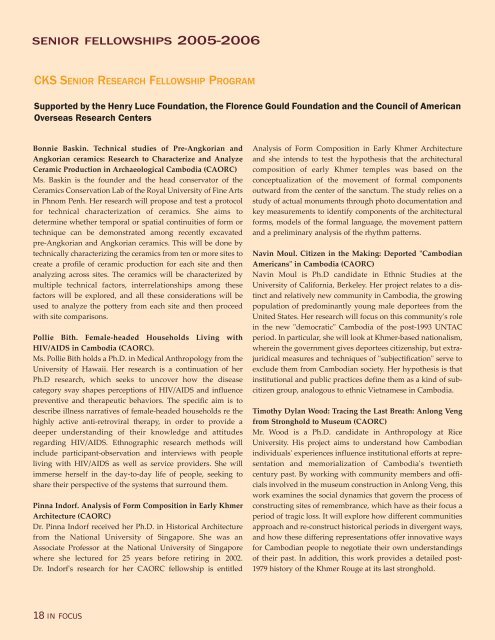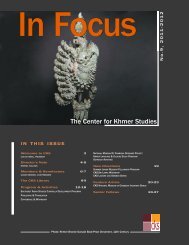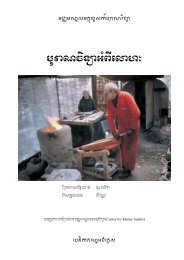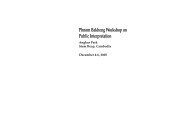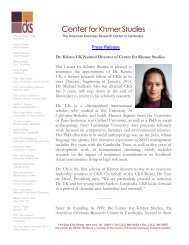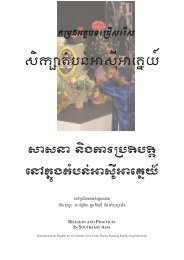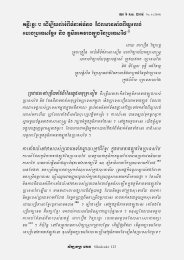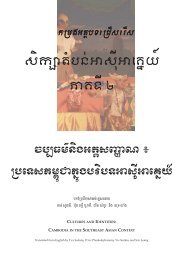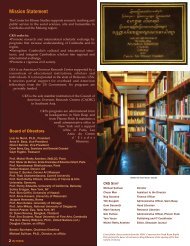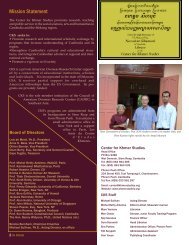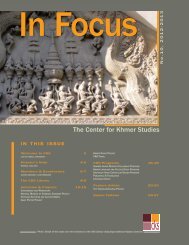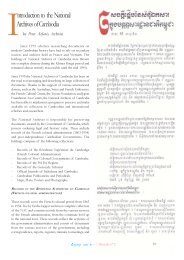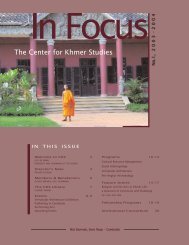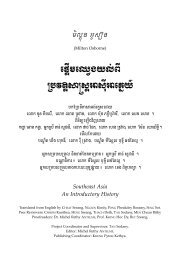In focus 2005-2006.qxd - Center for Khmer Studies
In focus 2005-2006.qxd - Center for Khmer Studies
In focus 2005-2006.qxd - Center for Khmer Studies
Create successful ePaper yourself
Turn your PDF publications into a flip-book with our unique Google optimized e-Paper software.
SENIOR FELLOWSHIPS <strong>2005</strong>-2006<br />
CKS SENIOR RESEARCH FELLOWSHIP PROGRAM<br />
Supported by the Henry Luce Foundation, the Florence Gould Foundation and the Council of American<br />
Overseas Research <strong>Center</strong>s<br />
Bonnie Baskin. Technical studies of Pre-Angkorian and<br />
Angkorian ceramics: Research to Characterize and Analyze<br />
Ceramic Production in Archaeological Cambodia (CAORC)<br />
Ms. Baskin is the founder and the head conservator of the<br />
Ceramics Conservation Lab of the Royal University of Fine Arts<br />
in Phnom Penh. Her research will propose and test a protocol<br />
<strong>for</strong> technical characterization of ceramics. She aims to<br />
determine whether temporal or spatial continuities of <strong>for</strong>m or<br />
technique can be demonstrated among recently excavated<br />
pre-Angkorian and Angkorian ceramics. This will be done by<br />
technically characterizing the ceramics from ten or more sites to<br />
create a profile of ceramic production <strong>for</strong> each site and then<br />
analyzing across sites. The ceramics will be characterized by<br />
multiple technical factors, interrelationships among these<br />
factors will be explored, and all these considerations will be<br />
used to analyze the pottery from each site and then proceed<br />
with site comparisons.<br />
Pollie Bith. Female-headed Households Living with<br />
HIV/AIDS in Cambodia (CAORC).<br />
Ms. Pollie Bith holds a Ph.D. in Medical Anthropology from the<br />
University of Hawaii. Her research is a continuation of her<br />
Ph.D research, which seeks to uncover how the disease<br />
category svay shapes perceptions of HIV/AIDS and influence<br />
preventive and therapeutic behaviors. The specific aim is to<br />
describe illness narratives of female-headed households re the<br />
highly active anti-retroviral therapy, in order to provide a<br />
deeper understanding of their knowledge and attitudes<br />
regarding HIV/AIDS. Ethnographic research methods will<br />
include participant-observation and interviews with people<br />
living with HIV/AIDS as well as service providers. She will<br />
immerse herself in the day-to-day life of people, seeking to<br />
share their perspective of the systems that surround them.<br />
Pinna <strong>In</strong>dorf. Analysis of Form Composition in Early <strong>Khmer</strong><br />
Architecture (CAORC)<br />
Dr. Pinna <strong>In</strong>dorf received her Ph.D. in Historical Architecture<br />
from the National University of Singapore. She was an<br />
Associate Professor at the National University of Singapore<br />
where she lectured <strong>for</strong> 25 years be<strong>for</strong>e retiring in 2002.<br />
Dr. <strong>In</strong>dorf's research <strong>for</strong> her CAORC fellowship is entitled<br />
Analysis of Form Composition in Early <strong>Khmer</strong> Architecture<br />
and she intends to test the hypothesis that the architectural<br />
composition of early <strong>Khmer</strong> temples was based on the<br />
conceptualization of the movement of <strong>for</strong>mal components<br />
outward from the center of the sanctum. The study relies on a<br />
study of actual monuments through photo documentation and<br />
key measurements to identify components of the architectural<br />
<strong>for</strong>ms, models of the <strong>for</strong>mal language, the movement pattern<br />
and a preliminary analysis of the rhythm patterns.<br />
Navin Moul. Citizen in the Making: Deported "Cambodian<br />
Americans" in Cambodia (CAORC)<br />
Navin Moul is Ph.D candidate in Ethnic <strong>Studies</strong> at the<br />
University of Cali<strong>for</strong>nia, Berkeley. Her project relates to a distinct<br />
and relatively new community in Cambodia, the growing<br />
population of predominantly young male deportees from the<br />
United States. Her research will <strong>focus</strong> on this community's role<br />
in the new "democratic" Cambodia of the post-1993 UNTAC<br />
period. <strong>In</strong> particular, she will look at <strong>Khmer</strong>-based nationalism,<br />
wherein the government gives deportees citizenship, but extrajuridical<br />
measures and techniques of "subjectification" serve to<br />
exclude them from Cambodian society. Her hypothesis is that<br />
institutional and public practices define them as a kind of subcitizen<br />
group, analogous to ethnic Vietnamese in Cambodia.<br />
Timothy Dylan Wood: Tracing the Last Breath: Anlong Veng<br />
from Stronghold to Museum (CAORC)<br />
Mr. Wood is a Ph.D. candidate in Anthropology at Rice<br />
University. His project aims to understand how Cambodian<br />
individuals' experiences influence institutional ef<strong>for</strong>ts at representation<br />
and memorialization of Cambodia's twentieth<br />
century past. By working with community members and officials<br />
involved in the museum construction in Anlong Veng, this<br />
work examines the social dynamics that govern the process of<br />
constructing sites of remembrance, which have as their <strong>focus</strong> a<br />
period of tragic loss. It will explore how different communities<br />
approach and re-construct historical periods in divergent ways,<br />
and how these differing representations offer innovative ways<br />
<strong>for</strong> Cambodian people to negotiate their own understandings<br />
of their past. <strong>In</strong> addition, this work provides a detailed post-<br />
1979 history of the <strong>Khmer</strong> Rouge at its last stronghold.<br />
18 IN FOCUS


